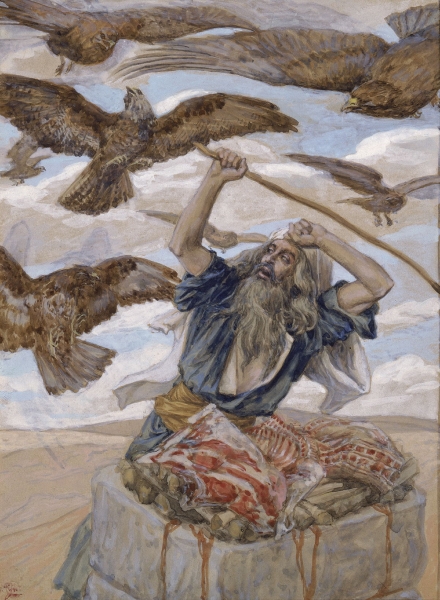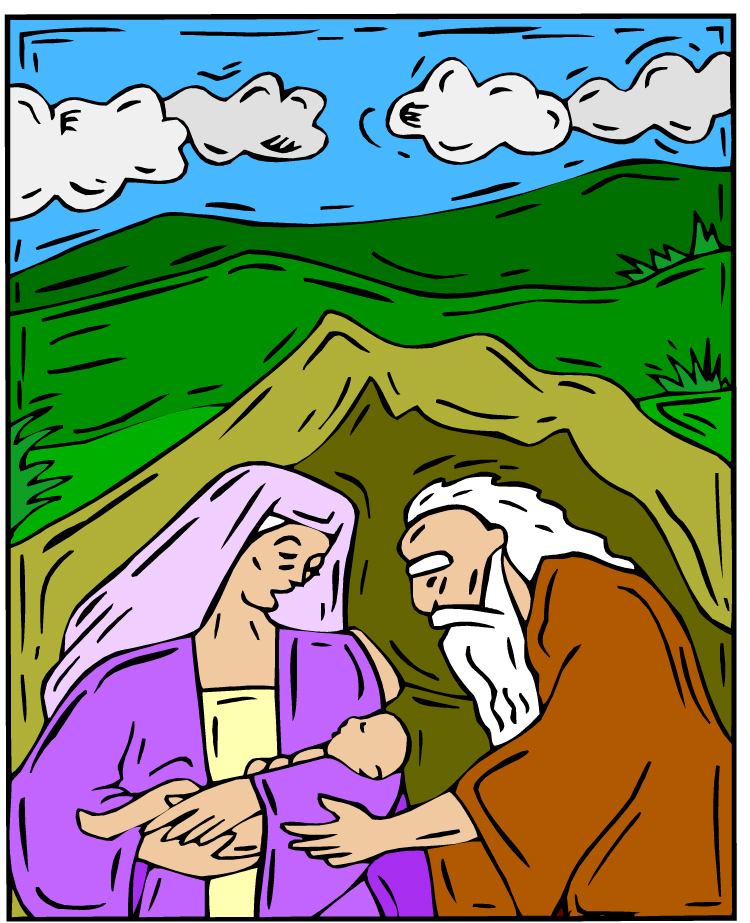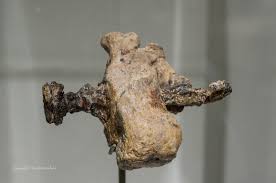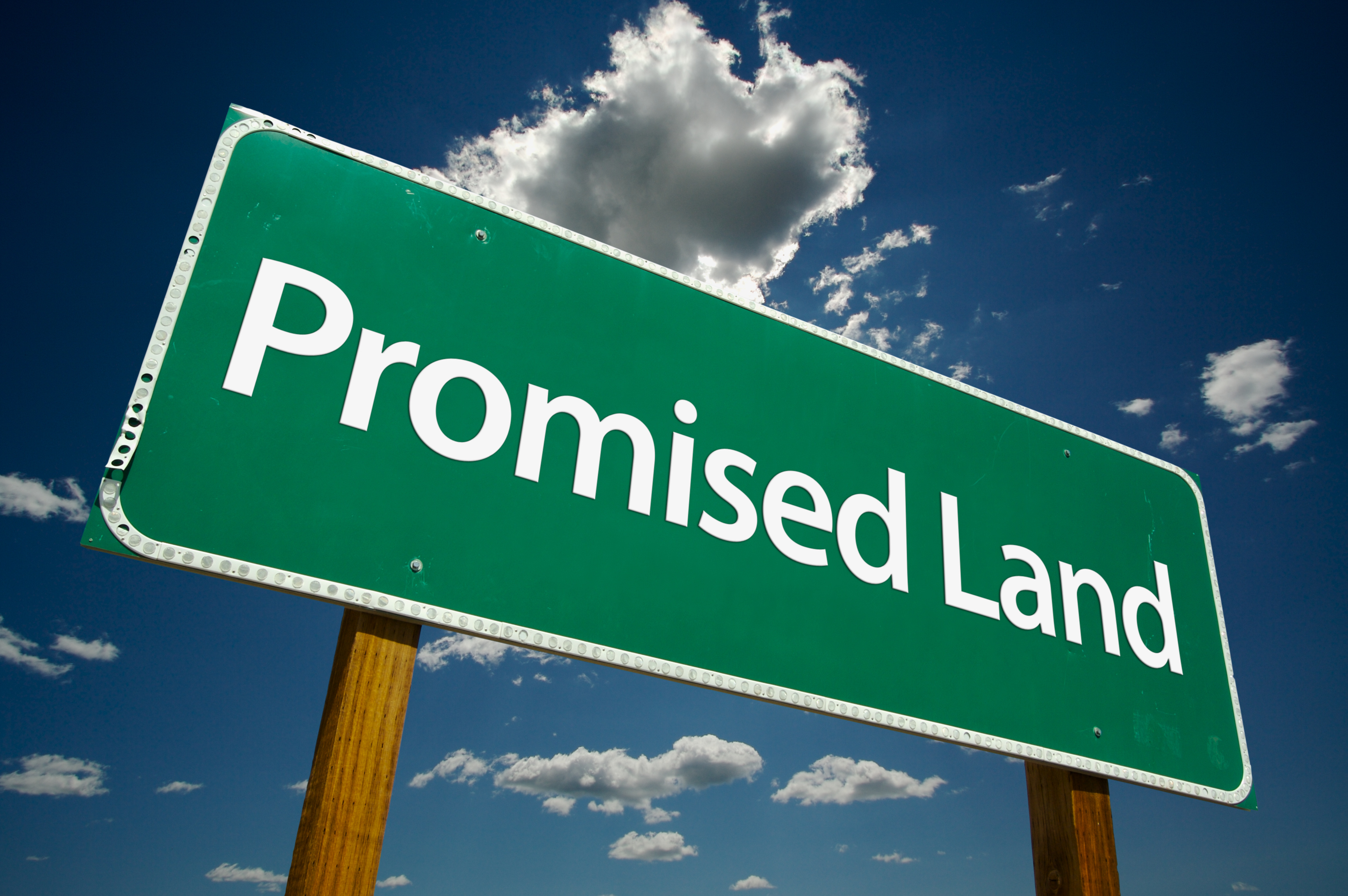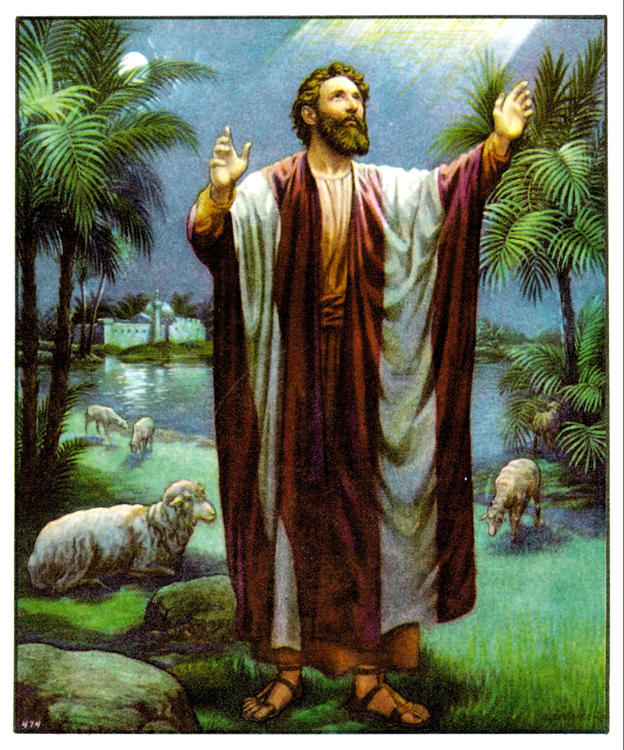Tag Archives: Abrahamic Covenant
The Abrahamic Covenant Vs. the Mosaic Covenant: Once we are saved, how are we to walk?

Romans 5:9, Being justified by his blood. Through Yeshua the Seed of Abraham through whom all nations would be blessed, believers are saved from their sins and blessed. Through Yeshua, the imputation of righteousness by faith and the justification (or right standing before Elohim) that it brings—a spiritual principle revealed in the life Abraham—is combined with the concept of being justified by his blood that is revealed in the Levitical sacrificial system.
Prophetic inferences to the sinner being atoned by the blood of an innocent and blemish-free lamb are to be found in Genesis 3:21 where YHVH covered the fallen Adam and Eve in garments of animal skins (very possibly, the skins of a lamb or some other kosher animal), and at the akeidah (the binding of Isaac) event on Mount Moriah in the substitutionary sacrifice of the lamb. This concept is further developed with YHVH’s command to the Israelites in Egypt to smear lamb’s blood on their door posts to protect them from the judgment of the death angel, and is more fully developed in the subsequent elaborate Levitical sacrificial system.
Broadly speaking, the Abrahamic Covenant and events in the life of Abraham surrounding its implementation reveal to man how to receive right-standing before Elohim, while the Mosaic Covenant and events surrounding its implementation reveal in more detail just how a man’s sins are atoned for, and then howman is to walk in righteousness once he attains right-standing with Elohim. This idea might be also stated in this way: Abraham’s being justified by his faith was a precondition to YHVH’s formulating the Abrahamic Covenant with him; Israel’s coming under the blood of the lamb, leaving Egypt and being “baptized” in the Red Sea were preconditions for YHVH formulating the Mosaic or Sinaitic Covenant with them. For the Renewed Covenant believer, Paul shows us that we must have faith in the Word (Logos) and promises of Elohim as Abraham did, and then come under the blood of the lamb, leave Egypt, be baptized and then follow Torah as the Children of Israel did to obtain and to maintain right-standing with Elohim, to be saved from the wrath to come and to have an eternal inheritance in YHVH’s kingdom.
It might be said, in a certain sense, that aspects of both the Abrahamic and Mosaic or Sinaitic covenants synergize together to construct the whole redemption or salvation “package.” In Romans, Paul weaves elements of both covenants together to form a systematic theology or a complete “package” showing the Renewed or New Covenant believer how to “get saved” and once “saved” how to stay “saved.”
Was Abraham saved by faith or by works or both?
Genesis 26:5, Because. Based on Paul’s teaching in Romans 4, we see that the Abrahamic Covenant is the model for salvation, which is salvation by grace through faith leading to or resulting in good works or righteousness (Eph 2:8–10).
From this verse, it might appear the Abrahamic Covenant wasn’t a faith-based covenant at all, but a works based one. In other words, Abraham had to do something to be counted righteous or to come into good standing with Elohim—a concept which is commonly referred to as “earning one’s salvation through one’s good works.”
The fact is that in the Abrahamic Covenant, Abraham only had to have faith and believe in YHVH to be justified or to be considered righteous by Elohim (Gen 15:6). It was on this basis that YHVH granted him “salvation.”
But this initial step of faith on Abraham’s part and the righteousness Elohim attributed to him was but the first step in Abraham’s faith walk. From that point, he had to walk out his faith and continue trusting YHVH (see also Gen 19:5).
The apostolic writers present the idea that one’s spiritual journey is a walk, not a one time event that occurs at the beginning of that walk. Our faith walk is more than just mental assent with a few emotions thrown in for good measure. It’s more than just following the golden rule about loving our neighbor in some nebulous sort of way. It involves faithfulness to YHVH’s instructions. James clearly states in his epistle that this is how one demonstrates the legitimacy of one’s faith when he declares that faith without works is dead (Jas 2:18, 20, 26; see vv. 12–26 for context).
Abraham demonstrated his faithfulness by his obedience to YHVH’s Torah or YHVH’s Word or voice. Furthermore, as a result of this obedience, YHVH promised to bless him beyond simply being granted initial salvation or righteousness.
This two-step approach or model still holds true in the Testimony of Yeshua. One is saved or delivered from the wages of their past sin (Rom 3:25), which is death (Rom 6:23) by their faith (initial salvation), and then one ceases from that sin by continuing in the good works of Torah obedience (Eph 2:8–10).
Moreover, Yeshua and the apostolic writers in numerous instances reveal that future rewards (both temporal and eternal rewards) come as a result of one’s good works (e.g. Matt 5:19). The ultimate reward is being granted eternal life and inclusion in the family of Elohim.
Do you fully discern the Lord’s body?
Gather my saints together unto me; those that have made/cut a covenant with me by sacrifice. (Psalm 50:5
Psalms 50:5, Made/cut a covenant…by sacrifice. This refers to the method by which covenants were made in ancient times between two parties. This same ritual occurred when YHVH made (or cut) a covenant with Abraham in Genesis chapter 15 except that YHVH took all the responsibilities for fulfilling the covenant upon himself, for Abraham was asleep when this covenant was cut (Gen 15:9–10, 12). All Abraham had to do was to have faith in YHVH and all the blessings of the Abrahamic Covenant would fall upon him (Gen 15:6). We know from Paul’s discussion in Romans chapter four that the Abrahamic Covenant is the original biblical model for how an individual can receive salvation from Elohim. We also know that when YHVH made his covenant with Abraham, the vision Abraham had while he was asleep prophetically pointed to Yeshua’s death on the cross and his initiating the new/renewed covenant as prophesied in the Tanakh (e.g. Jer 31:31–33; also see my discussion of Gen 15:12–21 at Abraham’s vision). Yeshua at his last supper and subsequent crucifixion fulfilled this ancient prophecy as well as the spiritual types and shadows discussed in Psalm 50:7 and Genesis 15:9–21. At his last supper, Yeshua made a new covenant with his disciples through his body (the bread) and blood (the wine), which redeemed believers now commemorate when they take communion.
And as they were eating, Jesus took bread, and blessed it, and brake it, and gave it to the disciples, and said, Take, eat; this is my body. And he took the cup, and gave thanks, and gave it to them, saying, Drink ye all of it; for this is my blood of the new testament, which is shed for many for the remission of sins. (Matt 26:26–28)
And when he had given thanks, he brake it, and said, Take, eat: this is my body, which is broken for you: this do in remembrance of me. (1 Cor 11:24)
Prior to his death on the cross, Yeshua’s predictively explained the significance of his broken body and spilled blood as it relates to covenantal agreement between him and those who would place their faith in him (as Abraham did in Gen 15).
35And Jesus said unto them, I am the bread of life: he that cometh to me shall never hunger; and he that believeth on me shall never thirst.…47 Verily, verily, I say unto you, He that believeth on me hath everlasting life.…50 This is the bread which cometh down from heaven, that a man may eat thereof, and not die.53 Then Jesus said unto them, Verily, verily, I say unto you, Except ye eat the flesh of the Son of man, and drink his blood, ye have no life in you.…58This is that bread which came down from heaven: not as your fathers did eat manna, and are dead: he that eateth of this bread shall live for ever. (John 6:35, 47, 50, 53, 58)
In the context of the Passover service when the saints through the ritual of communion annually commemorate Yeshua’s “cutting” the new covenant with his saints and then ratifying that covenant through his death, Paul has the following to say about the significance of Yeshua’s body:
For as often as ye eat this bread, and drink this cup, ye do shew the Lord’s death till he come. Wherefore whosoever shall eat this bread, and drink this cup of the Lord, unworthily, shall be guilty of the body and blood of the Lord. But let a man examine himself, and so let him eat of that bread, and drink of that cup. For he that eateth and drinketh unworthily, eateth and drinketh damnation to himself, not discerning the Lord’s body. (1 Cor 11:26–29)
Those who carelessly take communion are literally disrespecting not only the high value of the covenant that was made (or cut), but the tremendous price of making a covenant with Elohim (i.e. it cost Yeshua his life, and the believer must also die to himself as he accepts, unconditionally, Yeshua as his Lord and Master). Moreover, careless partakers of communion are not only underestimating the cost of their salvation, but the value and the benefits of that salvation, which is spiritual rewards including eternal life. Elohim is not only not duty bound to give immortality to such people, but would be foolish to immortalize people who don’t sufficiently recognize and appreciate the cost and value of covenantal agreement. In doing so, he would risk having another rebellion on his hand at some point in the future.
So when Yeshua died on the cross, he become the sacrifice that was cut (i.e. his body was brutally mutilated prior to and during his crucifixion) to which this verse in this Psalm 50 makes allusion.
Moreover, Abraham not only had faith in YHVH, but he had to walk out that faith the rest of his life, for faith without works is dead (Jas 2:14–26). Similarly, those who place their faith in Yeshua must also back up that faith by doing his words (John 5:24), doing good (John 5:29; 3:21), loving him and keeping his commandments (John 14:15), coming to the light of Elohim’s truth (John 3:20–21), and showing that they are overcoming the word, the flesh and the devil resulting in eternal life and great spiritual rewards in the world to come (Rev 2:7, 11, 17, 26; 3:5, 12, 21).
At the same time, those who don’t place their trust in Yeshua by accepting the covenant he “cut” through his death on the cross and then by backing that faith up with good deeds, or those who have “accepted” Yeshua, but lightly esteem him, will have a terrible price to pay.
For he that eateth and drinketh unworthily, eateth and drinketh damnation to himself, not discerning the Lord’s body. For this cause many are weak and sickly among you, and many sleep. (1 Cor 11:29–30)
Marvel not at this: for the hour is coming, in the which all that are in the graves shall hear his voice, and shall come forth; they that have done good, unto the resurrection of life; and they that have done evil, unto the resurrection of damnation. (John 5:28–29)
He that believeth on him is not condemned: but he that believeth not is condemned already, because he hath not believed in the name of the only begotten Son of God. (John 3:18)
The Promised Land Inheritance Is Still an Unfulfilled Promise
Numbers 34:2, This is the land. The land of Canaan as described in this passage is but a small portion of Israel’s total land inheritance from the Creator. In the Abrahamic Covenant YHVH made to Abraham and to his descendants, this promise has yet to be fulfilled to its fullest extent (review Gen 17:8 cp. 15:18). Never in Israel’s long history as a nation has it possessed and inhabited the land from Egypt to Iraq.
If YHVH’s promise hasn’t been fulfilled yet, unless he lied to Abraham and the Word of Elohim can’t be trusted, this promise is yet to be fulfilled.
In Ephesians 2:12, Paul mentions “covenants of promise” (plural). Most redeemed believers have heard of the New Covenant and know that it somehow relates to them, but Paul speaks of covenants (plural) with regard to the one-new man believer in Yeshua (read the next few verses for context).
Other than the New Covenant (singular), what other covenants (plural) that YHVH made with the nation Israel might Paul be referring to? The Abrahamic Covenant, of course.
Do you see yourself as a son of Abraham and an inheritor of these promises? (See Rom 4:16; 9:8–11; Gal 3:7, 9; 14, 28–29.) Paul did. What was Paul thinking, how does this affect you and your future, and how does this square with what the church typically teaches is the future inheritance of the saints?
Abraham’s Vision of the Renewed Covenant
One of the mottos of this ministry is “Connecting the message of the gospel to its Torah roots.” The commentary below on Gen 15:17–18 below is a prime example of this, and is something I love to do.
Why does it bring me such pleasure? For several reasons. It strengthens my faith in Messiah to see him prophesied about in the Bible thousands of years before his incarnation. It strengthens my faith in the Bible as the Word of Elohim. No one but the supreme sovereign omniscient superior mind of our Creator could have predicted such things long before they occurred. No other religion or religious book on earth contains such marvelous predictions as the Bible. In every way, it points to Elohim and its veracity is validated.
The other day, someone commented on my YouTube channel that it is pure human imagination to envision Yeshua prophesied about in the Tanach, that he isn’t in there. Then this sad soul went on to blather that Yeshua is not the Messiah, etc., etc. ad nauseam. The Bible says not to answer a fool according to his folly, for he will simply trample the pearls of truth like a swine shooting around in the muddy swill of his blind existence. There is none so blind as he refuses to see!
May the discussion below strengthen your faith in the Bible, in YHVH Elohim and in Yeshua the Messiah! Natan
In Genesis 15:17–18a, we read,
And it came to pass, that, when the sun went down, and it was dark, behold a smoking furnace, and a burning lamp that passed between those pieces. In the same day YHVH made a covenant with Abram …
What is the meaning of this? This is nothing other than YHVH giving Abram a prophetic vision of Yeshua the Redeemer of Israel dying on the cross paying for the sins of Abram’s descendants who would break that very covenant that YHVH had made with Abram on that day. Both Jewish and Christian biblical commentators recognize aspects of this truth, but they don’t have fuller prophetic picture. This we will explain below.
Let’s first establish the fact that YHVH passed through the pieces of a sacrificed animal. Rashi, the medieval Jewish Torah scholar, recognizes that the Divine Presence was the one who passed through the pieces of animal while Abram slept (Rashi’s commentary on Gen 15:10). Furthermore, The ArtScroll Tanach Series Bereishis/Genesis Commentary, vol 1a, states, “The smoke [which rose up into the thick darkness (Radak)] was the ‘Cloud and thick darkness’ which appeared at the revelation of the Torah and the torch in its midst was ‘the fire’ which appeared at Sinai [see Exod 19:18; Deut 5:4]”…. [Elohim] caused His Presence, symbolized by the fire, to pass through and conclude the Covenant.… [T]he culmination of this vision was that the fire consumed the pieces, causing their smoke to ascend to heaven…” (pp. 534–535). Christian commentators Keil and Delitzsch in their commentary on this passage state, “In this symbol [i.e. the smoking pot and the fiery torch], Jehovah manifested Himself to Abram, just as He afterwards did to the people of Israel in the pillar of cloud and fire” (Hendrickson, p. 138). So both notable Jewish and Christian scholars relate the smoke and the fire Abram saw pass between the pieces of meat to YHVH’s Presence in the cloud and pillar of fire that led Israel in the wilderness. We read in Exodus 13:21,
And YHVH went before them by day in a pillar of a cloud, to lead them the way; and by night in a pillar of fire, to give them light; to go by day and night.
Then in Exodus 14:19 it is written:
And the angel of Elohim, which went before the camp of Israel, removed and went behind them; and the pillar of the cloud went from before their face, and stood behind them.
Who is this “Angel” of Elohim (in other places: he is called “the Angel” of YHVH)? Angel is an unfortunate translation. The Hebrew word for angel is malak (lTKN) and simply means “a heavenly or a human messenger.” Prophetically this word can refer to human messengers such as the one coming in the spirit of Elijah prior to Messiah’s coming, as well as to the Messiah himself (“Messenger/Malak of the covenant” in Malachi 3:1). In Genesis 32:22–30, Jacob wrestles with a man the Scriptures identify as the Malak of YHVH (Hosea 12:3-5) and whom Jacob called Elohim (Hos 12:3–4). This same Individual redeemed Jacob (Gen 48:18) and is identified with the Malak of Elohim … the Elohim of Bethel (Gen 31:11 and 13), and appeared to Moses at the burning bush (Exod 3:2). Now we see this same Entity leading Israel in the wilderness. Again who is he? Stephen in Acts 7:37–39 identifies the Messiah (i.e. “that Prophet” Moses mentioned in Deut 18:15) with the “Angel” or Heavenly Messenger which spoke to the children of Israel from Mount Sinai and who gave them the “living oracles,” who the Israelites later rejected for pagan gods. Paul elsewhere said of this same Personage that the Israelites did “all drink the same spiritual drink: for they drank of that spiritual Rock that followed them: and that Rock was Messiah” (1 Cor 10:4).
Of that pillar of fire that led them, we see that it gave them light, and we know that light is a biblical metaphor for YHVH’s Torah (e.g., Prov 6:23). Additionally, we know that Yeshua the Messiah is the Light of the World (John 1:6–9; 8:12; 9:5)—the Word of Elohim in living form (personified; John 1:1–14).
So, to connect the dots, we see that Abram saw a vision of the pre-incarnate Yeshua passing through the pieces of meat as he ratified the Abrahamic Covenant. He accepted the offering as it went up to heaven in a cloud of smoke even as fire came forth from the same cloud in the holy of holies in the Tabernacle Moses and the same pre-incarnate Yeshua accepted the first sacrifice on the altar of sacrifice (Lev 9:24, see also Judg 6:20–21; 13:19–20).
But there is more.
The Jewish sages recognize that the smoking furnace Abram saw in his vision is a picture of Gehinnom (the valley in Jerusalem where in ancient times the city’s garbage was burned making it a poetic and prophetic representation of Elohim’s fiery judgment upon the wicked) or four periods of future judgment that would come upon Israel as a result of her apostasy (see Rashi’s commentary on Gen 15:17). This is the rabbinic interpretation of the smoking furnace. Let us now present to you a possible Messianic interpretation of this same smoking furnace.
In ancient biblical times when two parties would negotiate an agreement, both parties would pass through the animal halves symbolizing the life and death consequences of violating the terms of the agreement. A death curse was literally placed upon the one who would break the covenant.
In the case of the Abrahamic Covenant, we see that Yeshua in his pre-incarnate state was the one who passed through the pieces of meat while Abram slept. This signifies that Yeshua took upon himself the curse of death if either he or Abraham (or his descendants) in any way violated the terms and conditions of the Abrahamic Covenant. We know that Abrahams descendants did not remain faithful to their covenants with YHVH. YHVH used the Babylonians, Persians, Greeks and the Romans to punish them, but this punishment did not redeem them from having violated their covenantal agreement. Yeshua, YHVH’s heavenly Messenger, took that full responsibility upon himself when he passed through the pieces of meat. He took upon himself the full and unconditional consequences of the sinful actions of Abraham’s descendants, which are the saints (Gal 3:29). The fiery wrath of Elohim’s judgment against sin (i.e. violation of Torah, see 1 John 3:4) came upon him and he was crucified by the Romans at Calvary. It is through the shed blood of Yeshua who paid for our sins that we enter into renewed covenant with the same Yeshua (as did Abraham) and become sons of Abraham, as well as adopted sons of Elohim resulting in eternal life. This is the message of Paul the apostle in Epistle to the Romans. We believe that this is how Genesis 15 foretells the future apostasy of Israel, the rise of Messiah Yeshua, the Savior and Redeemer of Israel, and his death at the cross to pay the legal price for their sins of rebellion and disobedience to YHVH and his commandments.


